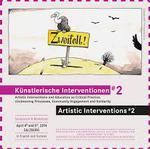Artistic Interventions II: “Artistic Interventions and Education as Critical Practice” (Salzburg, April 4th and 5th, 2014)
type=project
As continuation of the symposium series “Artistic Interventions. Collaborative and self-organized practices. With a focus on anti-racist and feminist perspectives” held in autumn 2013, we are organizing for the current semester, a symposium on “Artistic Interventions and Education as Critical Practice – (Un)learning processes, community engagement, and solidarity” scheduled for April 2014.
This symposium’s presentations and two workshops—with Janna Graham/Centre for Possible Studies, Nicolas Vass/ Precarious Workers Brigade, and Annette Krauss/Read-in—will explore the ways that artistic interventions can create open and shared collaborative and informal learning spaces for empowerment and agency in educational contexts, and in exchange and solidarity with social movements.
Focusing on critical practices at various intersections of the arts and education and exploring new settings of research and action aiming at social transformation, this symposium will offer possibilities to discuss and actively engage in practices—especially during the in-depth workshops—that challenge (un)learning processes and hierarchical knowledge systems, and develop interventions (in public space) related to the issue of community engagement and artist solidarity.
Symposium:
Presentations:
April 4th, 2014: 9 a.m.–12 noon, location: Salzburg College, Bergstraße 12, ground floor
Annette Krauss: In Search of the Missing Lessons
Janna Graham & Nicolas Vass: What We Didn’t Learn at Art School: The Politics of Solidarity
Workshops:
Annette Krauss: Practices of Unlearning (location: Bibliothek, Bergstraße 12, 1st floor)
Janna Graham & Nicolas Vass: Crazy Little Thing Called Love: The Ethics of Solidarity (location: Salzburg College, Bergstraße 12, ground floor)
April 4th, 2014: 1 –5 p.m.
April 5th, 2014: 9 a.m.–5 p.m. (public presentations from 4–5 p.m.)
Registration (deadline March 28th):
Programmbereich Contemporary Arts & Cultural Production
Schwerpunkt Wissenschaft & Kunst
Bergstraße 12
5020 Salzburg
++43 (0)662 8044 2383
roswitha [dot] gabriel![]() sbg [dot] ac [dot] at
sbg [dot] ac [dot] at
www.w-k.sbg.ac.at/interventionen
A cooperation with Salzburg College
Biographies:
Janna Graham, originally trained in geography, has developed radical research and pedagogical projects in and outside of the arts for many years. Graham is a member of the international sound and political art collective Ultra-red, works with the Precarious Workers Brigade in London, and is currently Projects Curator at the Serpentine Gallery. There she and others have created the Centre for Possible Studies, a research space and artistic residency in which artists and local people create “studies of the possible” that expose and respond to social inequities in the Edgware Road neighborhood of London.
Nicolas Vass works with a number of London-based collectives in response to injustices in cultural labor, education, and UK migration policy. For many years he has developed the performance Re-constructing Hasil, a tribute to depression era one man band Hasil Adkins, looking at issues of contemporary cultural labor, austerity, and performativity. He is currently a PhD candidate at the University of Leicester developing a study of where value is produced in the chain of contemporary art fabrication.
Annette Krauss (based in Utrecht/NL) received her MA in Fine Arts from the Art Academy Malmoe in 2002. In her conceptual-based practice she addresses the intersection of art, politics, and everyday life. Her work revolves around informal knowledge and (institutionalized) normalization processes that shape our bodies, the way we use objects and engage in social practices and how these influence the way we know and act in the world. Her artistic work emerges through the intersection of different media, such as performance, film, historical and everyday research, pedagogy, and texts. She explores the possibilities of participatory practices, self-organization, and investigations into institutional structures.

